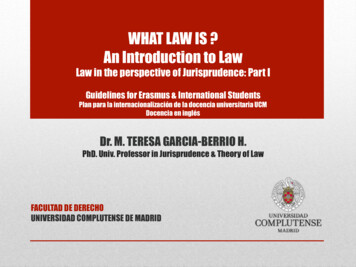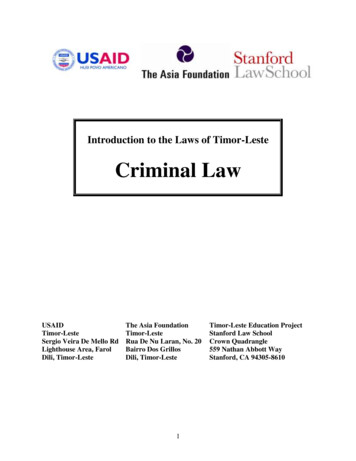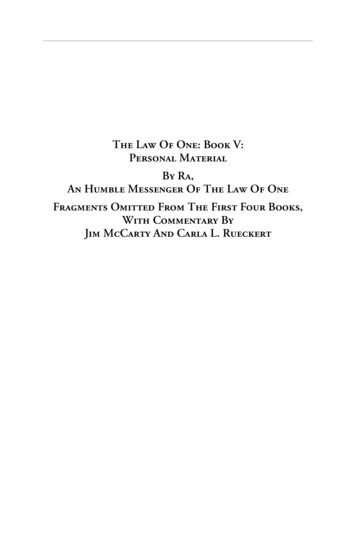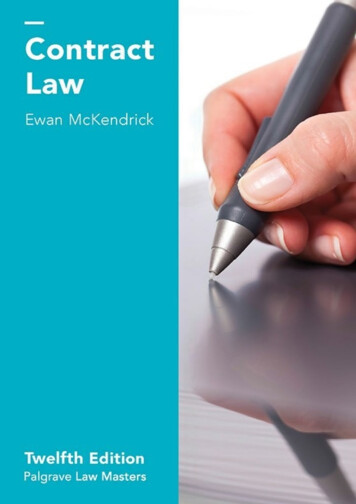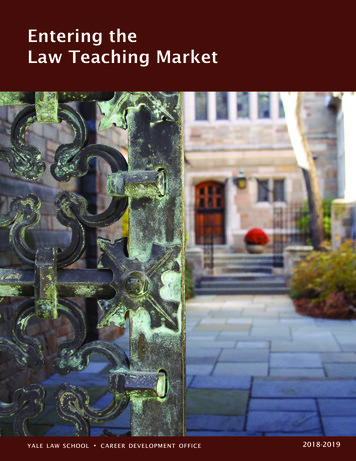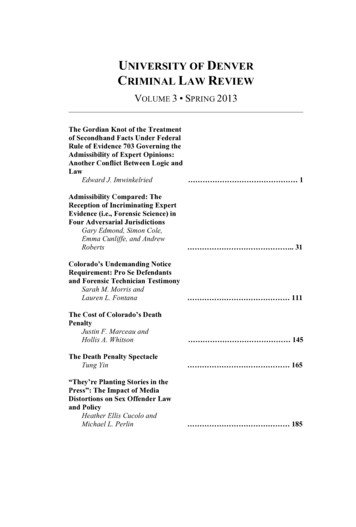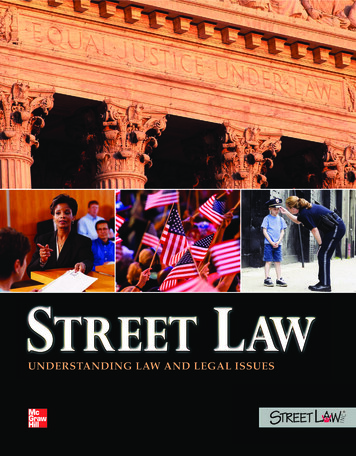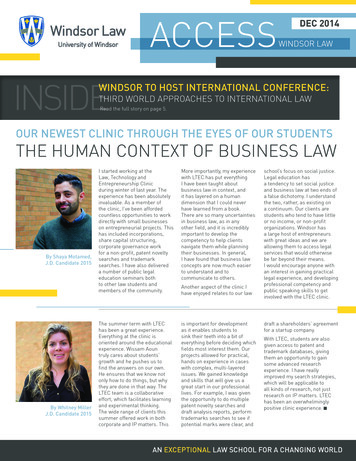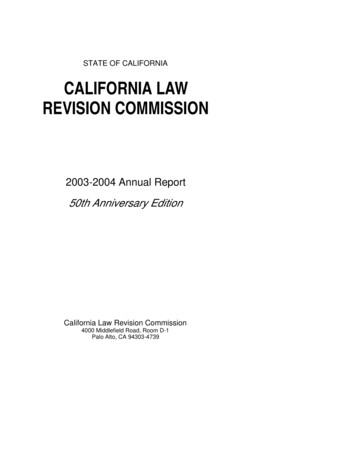
Transcription
STATE OF CALIFORNIACALIFORNIA LAWREVISION COMMISSION2003-2004 Annual Report50th Anniversary EditionCalifornia Law Revision Commission4000 Middlefield Road, Room D-1Palo Alto, CA 94303-4739
CALIFORNIA LAW REVISION COMMISSIONCOMMISSION MEMBERSF RANK KAPLANChairpersonWILLIAM E. W EINBERGERELLEN M. CORBETTVice ChairpersonAssembly MemberDIANE F. BOYER-VINEB ILL MORROWLegislative CounselSenate MemberEDMUND L. REGALIAMemberCOMMISSION STAFFLegalNATHANIEL S TERLINGExecutive SecretaryB RIAN HEBERTAssistant Executive SecretaryB ARBARA S. GAALStaff CounselAdministrative-SecretarialVICTORIA V. MATIASSecretaryNOTEThe Commission’s reports, recommendations, and studies arepublished in separate pamphlets that are later bound in hardcoverform. The page numbers in each pamphlet are the same as in thevolume in which the pamphlet is bound, which permits citation toCommission publications before they are bound.This publication (#217) will appear in Volume 33 of the Commission’s Reports, Recommendations, and Studies.Commission publications and other materials are available on theInternet at www.clrc.ca.gov.
2003]569STATE OF CALIFORNIACALIFORNIA LAWREVISION COMMISSION2003-2004 Annual Report50th Anniversary EditionCalifornia Law Revision Commission4000 Middlefield Road, Room D-1Palo Alto, CA 94303-4739
5702003-2004 ANNUAL REPORT[Vol. 33Cite this pamphlet as 2003-2004 Annual Report, 33 Cal. L.Revision Comm’n Reports 569 (2003). This is publication #217.
2003]2003-2004 ANNUAL REPORT571SUMMARY OF WORK OF COMMISSIONThe year 2003-2004 marks the 50th anniversary of the creationof the California Law Revision Commission.Recommendations Enacted in the 2003 Legislative SessionIn 2003, five bills effectuating the Commission’srecommendations were enacted, relating to the following subjects: Exemptions from enforcement of money judgments (seconddecennial review) Organization of Davis-Stirling Common InterestDevelopment Act Probate Code technical corrections Procedural fairness in homeowners association rulemakingand decisionmaking Statutes made obsolete by trial court restructuring (part 2) Stay of mechanic’s lien enforcement pending arbitrationA resolution was adopted continuing the Commission’s authorityto study 20 topics previously authorized and adding authority tostudy the Uniform Statute and Rule Construction Act (1995).Recommendations to the 2004 LegislatureIn 2004, the Commission plans to submit recommendations onthe following subjects to the Legislature: Alternative dispute resolution in common interestdevelopments Authority of court commissioner Reorganization of discovery statute Unincorporated associationsIn addition, the Commission recommends enactment of twomeasures introduced in 2003 that remain pending in the Legislatureas two-year bills to the extent they would effectuate Commissionrecommendations on the following subjects: Double liability problem in home improvement contracts Obsolete reporting requirements
5722003-2004 ANNUAL REPORT[Vol. 33The Commission may submit additional recommendations ifwork is completed in time to enable their introduction during thelegislative session.Commission Activities Planned for 2004During 2004, the Commission will work on the following majortopics: financial privacy, mechanic’s lien law, common interestdevelopment law, discovery improvements from otherjurisdictions, jurisdictional limits of small claims and limited civilcases, governance of unincorporated associations, and conformingthe California Evidence Code to the Federal Rules of Evidence.The Commission will also consider other subjects to the extenttime permits.
2003]2003-2004 ANNUAL REPORT573CONTENTSPage2003-2004 ANNUAL REPORT . 577Introduction . 5772004 Legislative Program . 579Major Studies in Progress . 580Financial Privacy . 580Mechanic’s Lien Law . 580Common Interest Development Law . 581Discovery Improvements from Other Jurisdictions . 581Jurisdictional Limits of Small Claims and LimitedCivil Cases . 581Governance of Unincorporated Associations . 581Conforming Evidence Code to Federal Rules ofEvidence . 581Other Subjects . 582Calendar of Topics for Study . 582Function and Procedure of Commission . 582Background Studies . 584Recommendations . 584Official Comments . 586Commission Materials as Legislative History . 586Use of Commission Materials To DetermineLegislative Intent . 588Publications . 591Electronic Publication and Internet Access . 592Electronic Mail . 593MCLE Credit . 593Personnel of Commission . 593Commission Budget . 595Other Activities . 596National Conference of Commissioners on UniformState Laws . 597Legislative History of Recommendations . 597Stay of Mechanic’s Lien Enforcement PendingArbitration . 597
5742003-2004 ANNUAL REPORT[Vol. 33Probate Code Technical Corrections . 598Statutes Made Obsolete by Trial Court Restructuring . 598Exemptions from Enforcement of Money Judgments . 598Procedural Fairness in CID Rulemaking andDecisionmaking . 598Organization of Davis-Stirling CID Act . 599Obsolete Reporting Requirements . 599Double Liability Problem in Home ImprovementContracts . 599Resolution Authorizing Topics for Study . 599Report on Statutes Repealed by Implication or HeldUnconstitutional . 599Recommendations . 601APPENDICES1. Statute Governing the California Law RevisionCommission . 6032. Calendar of Topics Authorized for Study . 6093. Legislative Action on Commission Recommendations(Cumulative) . 6134. Report of the California Law Revision Commissionon Chapter 22 of the Statutes of 2003 (Senate Bill113): Stay of Mechanic’s Lien EnforcementPending Arbitration . 6415. Report of the California Law Revision Commissionon Chapter 149 of the Statutes of 2003 (SenateBill 79): Statutes Made Obsolete by Trial CourtRestructuring: Part 2 . 6436. Report of the California Law Revision Commissionon Chapter 557 of the Statutes of 2003 (AssemblyBill 512): Organization of Davis-Stirling CommonInterest Development Act; Common InterestDevelopment Law: Procedural Fairness inAssociation Rulemaking and Decisionmaking . 6457. Commission Publications . 649
2003]2003-2004 ANNUAL REPORT575STATE OF CALIFORNIACALIFORNIA LAW REVISION COMMISSION4000 MIDDLEFIELD ROAD, ROOM D-1PALO ALTO, CA 94303-4739650-494-1335FRANK KAPLAN, ChairpersonWILLIAM E. WEINBERGER, Vice ChairpersonDIANE F. BOYER-VINEASSEMBLY MEMBER ELLEN M. CORBETTSENATOR BILL MORROWEDMUND L. REGALIANovember 21, 2003To: The Honorable Arnold SchwarzeneggerGovernor of California, andThe Legislature of CaliforniaIn conformity with Government Code Section 8293, theCalifornia Law Revision Commission submits this report of itsactivities during 2003 and its plans for 2004.This year marks the 50th anniversary of the creation of the LawRevision Commission. During that period the Commission hasbecome an important feature of the state’s legal landscape,providing a reliable source for nonpartisan reform of Californialaw. Notable enactments on Commission recommendation includecreation of the Evidence Code, recodification of the Probate Code,and establishment of the Family Code. Many statutesrecommended by the Commission have become national models,including the Eminent Domain Law and the Trust Act. Other majorenactments recommended by the Commission include thegovernmental liability act, prejudgment remedies and enforcementof judgments law, real property remedies, power of attorney laws,Administrative Procedure Act reform, Health Care Decisions Law,and implementation of trial court unification. In all, more than 300recommendations of the Commission have been enacted into law,affecting more than 20,000 sections of the California codes — aliving testament to the foresight of the Legislature and Governorwho, 50 years ago, established the Commission as a permanentinstitution for ongoing improvement of California law.Five bills and one resolution introduced in 2003 to effectuateCommission recommendations were enacted. Two Commissionrecommendations that were introduced remain pending as two-yearbills.
5762003-2004 ANNUAL REPORT[Vol. 33The Commission is grateful to the members of the Legislaturewho carried Commission-recommended legislation: Assembly Member Patricia C. Bates (procedural fairness inCID rulemaking and decisionmaking; organization of DavisStirling CID Act) Assembly Member John Dutra (double liability problem inhome improvement contracts) Assembly Member Tom Harman (Probate Code technicalrevisions; exemptions from enforcement of moneyjudgment) Senator Dick Ackerman (stay of mechanic’s lienenforcement pending arbitration) Senator Wm. “Pete” Knight (obsolete reportingrequirements) Senator Bill Morrow (resolution of Commission authority) Senate Judiciary Committee (trial court restructuring)The Commission held four one-day meetings and one two-daymeeting during 2003. Meetings were held in Burbank andSacramento.Respectfully submitted,Frank KaplanChairperson
2003]5772003-2004 ANNUAL REPORT50th Anniversary EditionThis year marks the 50th anniversary of the creation of the LawRevision Commission.1 During that period the Commission hasbecome an important feature of the state’s legal landscape,providing a reliable source for nonpartisan reform of Californialaw. Notable enactments on Commission recommendation includecreation of the Evidence Code, recodification of the Probate Code,and establishment of the Family Code. Many statutesrecommended by the Commission have become national models,including the Eminent Domain Law and the Trust Act. Other majorenactments recommended by the Commission include thegovernmental liability act, prejudgment remedies and enforcementof judgments law, real property remedies, power of attorney laws,Administrative Procedure Act reform, Health Care Decisions Law,and implementation of trial court unification. In all, more than 300recommendations of the Commission have been enacted into law,affecting more than 20,000 sections of the California codes — aliving testament to the foresight of the Legislature and Governorwho, 50 years ago, established the Commission as a permanentinstitution for ongoing improvement of California law.IntroductionThe California Law Revision Commission was created in 1953as the permanent successor to the Code Commission and givenresponsibility for a continuing substantive review of Californiastatutory and decisional law.2 The Commission studies the law todiscover defects and anachronisms and recommends legislation tomake needed reforms.1. See 1953 Cal. Stat. ch. 1445, operative September 9, 1953. The firstmeeting of the Commission was held on February 23, 1954.2. See Gov’t Code §§ 8280-8298 (statute establishing Law RevisionCommission) (Appendix 1 infra). See also 1955 Report [Annual Report for1954] at 7, 1 Cal. L. Revision Comm’n Reports (1957).
5782003-2004 ANNUAL REPORT[Vol. 33The Commission assists the Legislature in keeping the law up todate by: Intensively studying complex and sometimes controversialsubjects Identifying major policy questions for legislative attention Gathering the views of interested persons and organizations Drafting recommended legislation for legislative considerationThe Commission’s efforts enable the Legislature to focus onsignificant policy questions in a recommendation rather than on thetechnical issues that can be resolved in the process of preparingbackground studies, working out intricate legal problems, anddrafting implementing legislation. The Commission thus helps theLegislature accomplish needed reforms that otherwise might not bemade because of the heavy demands on legislative time. In somecases, the Commission’s report demonstrates that no newlegislation on a particular topic is needed, thus relieving theLegislature of the need to study the topic.The Commission consists of:3 A Member of the Senate appointed by the Rules Committee A Member of the Assembly appointed by the Speaker Seven members appointed by the Governor with the adviceand consent of the Senate The Legislative Counsel, who is an ex officio memberThe Commission may study only topics that the Legislature hasauthorized. The Commission now has a calendar of 21 topics.4The Commission has submitted 352 recommendations to theLegislature — 328 have been enacted in whole or in substantialpart.5 Commission recommendations have resulted in theenactment of legislation affecting 21,716 sections of California3. For current membership, See “Personnel of Commission,” infra.4. See list of topics in Calendar of Topics Authorized for Study, Appendix 2infra.5. See Legislative Action on Commission Recommendations, Appendix 3infra.
2003]2003-2004 ANNUAL REPORT579law: 4,245 sections amended, 9,203 sections added, and 8,268sections repealed.The Commission’s recommendations, reports, and other selectedmaterials are published in softcover and later collected inhardcover volumes. Recent materials are also available through theInternet. A list of past publications and information on obtainingprinted or electronic versions are at the end of this Annual Report.62004 Legislative ProgramIn 2004, the Commission plans to submit recommendations tothe Legislature concerning the following subjects:Civil Procedure and Judicial AdministrationAuthority of Court Commissioner. The Commission willrecommend cleanup of Code of Civil Procedure provisionsgoverning the authority of a court commissioner, with the objectiveof eliminating obsolete provisions relating to notarial functions andcorrecting the standard under which a commissioner may serve astemporary judge.Reorganization of Discovery Statute. The Commission willrecommend nonsubstantive reorganization of the civil discoverystatute, splitting unduly long statutes into shorter, more userfriendly, provisions.Common Interest Development LawThe Commission will recommend improvement of themechanisms available to homeowners and associations to resolvedisputes between them outside of court.Unincorporated AssociationsThe Commission will recommend consolidation and clarificationof the laws governing unincorporated associations.Mechanic’s LiensThe Commission has previously recommended revision of themechanic’s lien law to address the double payment problem arisingunder home improvement contracts. The Commission will pursue6. See Commission Publications, Appendix 7 infra.
5802003-2004 ANNUAL REPORT[Vol. 33legislative implementation of this recommendation by appropriateamendment of pending legislation.Obsolete Reporting RequirementsThe Commission will continue to seek enactment of previouslyrecommended legislation to clean out of the codes numerousobsolete statutory provisions that required state agencies to preparevarious reports. The legislation remains pending as a two-year bill.Major Studies in ProgressDuring 2004, the Commission will work on the following majortopics: financial privacy, mechanic’s lien law, common interestdevelopment law, discovery improvements from otherjurisdictions, jurisdictional limits of small claims and limited civilcases, governance of unincorporated associations, and conformingthe California Evidence Code to the Federal Rules of Evidence.The Commission will also consider other subjects to the extenttime permits.Financial PrivacyThe Legislature in 2002 directed the Commission to study, reporton, and prepare recommended legislation concerning the protectionof personal information relating to, or arising out of, financialtransactions. The report is due January 1, 2005. In light of theLegislature’s enactment of comprehensive legislation in Californiain 2003, the main tasks remaining involve the interrelation of thenew legislation with federal law and with other state law. TheCommission will continue to give this matter a high priority during2004.Mechanic’s Lien LawThe Commission has initiated work on mechanic’s lien lawpursuant to a legislative request for a comprehensive review on apriority basis. The Commission interrupted its progress on thisstudy in 2003 during a transitional period of personnel changes anddeclining resources, but plans to reactivate the study on a prioritybasis during 2004.
2003]2003-2004 ANNUAL REPORT581Common Interest Development LawThe Commission will continue its review of statutes affectingcommon interest housing developments with the goal of setting aclear, consistent, and unified policy regarding their formation andmanagement and the transaction of real property interests locatedwithin them. The objective of the review is to clarify the law andeliminate unnecessary or obsolete provisions, to consolidateexisting statutes in one place in the codes, and to determine to whatextent common interest developments should be subject toregulation.Discovery Improvements from Other JurisdictionsThe Commission in 2004 will continue its review of discoverydevelopments in other jurisdictions to determine whether they maybe appropriate models for improvement of discovery practice inCalifornia. Professor Gregory S. Weber of McGeorge School ofLaw has prepared a background study for the Commission.Jurisdictional Limits of Small Claims and Limited Civil CasesThe Commission is conducting a review of basic trial courtprocedures under unification. In 2004, the Commission willcontinue its study of what, if any, changes should be made to thejurisdictional limits for use of small claims and limited civil caseprocedures in the unified courts. This is a joint project with theJudicial Council.Governance of Unincorporated AssociationsThe Commission has completed its analysis of whether theUniform Unincorporated Nonprofit Association Act should beadopted in California in whole or in part and made itsrecommendations to the Legislature for appropriate revision of thelaw. During 2004 the Commission will turn to issues involvingunincorporated association governance. The Commission isworking closely with the State Bar Nonprofit OrganizationsCommittee.Conforming Evidence Code to Federal Rules of EvidenceThe Commission has commenced work to determine whether theCalifornia Evidence Code should be conformed to the Federal
5822003-2004 ANNUAL REPORT[Vol. 33Rules of Evidence on points where they differ. This is a multi-yearproject that will cover the entire Evidence Code in discretesegments. During 2004 the Commission will continue to focus onthe hearsay rule and its exceptions. Professor Miguel Méndez ofStanford Law School is preparing a series of background studiesfor the Commission.Other SubjectsThe major studies in progress described above will dominate theCommission’s time and resources during 2004. The Commissionwill consider other subjects as time permits, including appellatejurisdiction issues resulting from trial court unification, waiver ofevidentiary privileges, statutes of limitation in legal malpracticeactions, and the Uniform Trust Code. The Commission is alsoanticipating receipt of a background study on possible arbitrationimprovements from other jurisdictions.Calendar of Topics for StudyThe Commission’s calendar includes 21 topics authorized by theLegislature for study. 7 Due to its current heavy workload andreduced resources, the Commission recommends that no newtopics be added to its calendar in 2004.Function and Procedure of CommissionThe principal duties of the Commission are to:8(1) Examine the common law and statutes for the purposeof discovering defects and anachronisms.(2) Receive and consider suggestions and proposedchanges in the law from the American Law Institute,the National Conference of Commissioners onUniform State Laws,9 bar associations, and other7. See Calendar of Topics Authorized for Study, Appendix 2 infra.8. Gov’t Code §§ 8280-8298 (statute governing California Law RevisionCommission). See Appendix 1 infra.9. The Legislative Counsel, an ex officio member of the Law RevisionCommission, serves as a Commissioner of the Commission on Uniform StateLaws. See Gov’t Code § 8261. The Commission’s Executive Secretary serves as
2003]2003-2004 ANNUAL REPORT583learned bodies, and from judges, public officials,lawyers, and the public generally.(3) Recommend such changes in the law as it deemsnecessary to bring California law into harmony withmodern conditions.10The Commission is required to file a report at each regularsession of the Legislature containing a calendar of topics selectedby it for study, listing both studies in progress and topics intendedfor future consideration. Under its general authority, theCommission may study only topics that the Legislature, byconcurrent resolution, authorizes for study.1 1 However, theCommission may study and recommend revisions to correcttechnical or minor substantive defects in state statutes without aprior concurrent resolution.12 Additionally, some statutes directlyconfer authority to study particular subjects.13an Associate Member of the National Conference of Commissioners on UniformState Laws.10. Gov’t Code § 8289. The Commission is also directed to recommend theexpress repeal of all statutes repealed by implication, or held unconstitutional bythe California Supreme Court or the United States Supreme Court. Gov’t Code §8290. See “Report on Statutes Repealed by Implication or HeldUnconstitutional” infra.11. Gov’t Code § 8293. Section 8293 requires a concurrent resolutionauthorizing the Commission to study topics contained in the calendar of topicsset forth in the Commission’s regular report to the Legislature. Section 8293 alsorequires that the Commission study any topic that the Legislature by aconcurrent resolution refers to the Commission for study. For an example of aconcurrent resolution referring a specific topic to the Commission for study, see2002 Cal. Stat. res. ch. 167 (ACR 125) (financial privacy study).12. Gov’t Code § 8298.13. Code of Civil Procedure Section 703.120(a) requires the Commission toreview statutes providing for exemptions from enforcement of money judgmentsevery 10 years and to recommend any needed revisions. The Commission alsohas continuing statutory authority to study enforcement of judgments pursuant toCode of Civil Procedure Section 703.120(b).Government Code Section 70219 requires the Commission, in consultationwith the Judicial Council, to perform follow-up studies taking into considerationthe experience in courts that have unified. For a list of specific studies, see TrialCourt Unification: Revision of Codes, 28 Cal. L. Revision Comm’n Reports 51,82-86 (1998).
5842003-2004 ANNUAL REPORT[Vol. 33Background StudiesThe Commission’s work on a recommendation typically beginsafter a background study has been prepared. The background studymay be prepared by a member of the Commission’s staff or by aspecialist in the field who is retained as a consultant.14 Lawprofessors and practicing attorneys who serve as consultants havealready acquired the considerable knowledge necessary tounderstand the specific problems under consideration, and receivelittle more than an honorarium for their services. From time totime, expert consultants are also retained to advise the Commissionat meetings.RecommendationsAfter making its preliminary decisions on a subject, theCommission ordinarily distributes a tentative recommendation tointerested persons and organizations, including the State Bar, localGovernment Code Section 71674 requires the Commission to recommendrepeal of provisions made obsolete by the Trial Court Employment Protectionand Governance Act (Gov’t Code § 71600 et seq.), Lockyer-Isenberg TrialCourt Funding Act of 1997 (1997 Cal. Stat. ch. 850), and the implementation oftrial court unification.Statutory authority may not be codified. See, e.g., 1996 Cal. Stat. ch. 856, §12 (study of revisions of Public Utilities Code resulting from utilityderegulation, in consultation with Public Utilities Commission).14. The following persons serve as Commission consultants: James E. Acret,Thelen, Reid & Priest, Pacific Palisades; Prof. Roger P. Alford, PepperdineUniversity School of Law; Prof. Michael Asimow, UCLA Law School; Prof.David M. English, University of Missouri Law School; Prof. Susan F. French,UCLA Law School; David Gould, McDermott, Will & Emery, Los Angeles;Brian Gurwitz, Deputy District Attorney, Orange County; Prof. Edward C.Halbach, Jr., Berkeley; Judge Joseph B. Harvey (ret.), Susanville; Keith Honda,Principal Administrative Analyst, Monterey County; Prof. Michael Hone,University of San Francisco School of Law; Gordon Hunt, Hunt, Ortmann,Blasco, Palffy & Rossell, Pasadena; Prof. Gideon Kanner, Berger & Norton,Burbank (formerly with Loyola Law School); Prof. J. Clark Kelso, McGeorgeSchool of Law, Capital Center for Government Law and Policy; Prof. WilliamM. McGovern, UCLA Law School; Prof. Miguel A. Méndez, Stanford LawSchool; Mark Overland, Overland & Gits, Santa Monica; Prof. Frederick Tung,University of San Francisco School of Law; Prof. Gerald F. Uelmen, Santa ClaraUniversity School of Law; Prof. Gregory S. Weber, McGeorge School of Law;Judge David S. Wesley, Los Angeles Superior Court.
2003]2003-2004 ANNUAL REPORT585and specialized bar associations, public interest organizations, andbusiness and professional associations. Notice of the availability ofthe tentative recommendation is mailed to interested persons on theCommission’s mailing list and publicized in legal newspapers andother relevant publications. Notice is also posted on theCommission’s website and emailed to interested persons.Comments received on the tentative recommendation areconsidered by the Commission in determining whatrecommendation, if any, will be made to the Legislature. When theCommission has reached a conclusion on the matter,15 itsrecommendation to the Legislature (including a draft of anynecessary legislation) is published and distributed in printed formand in digital form on the Internet. If a background study has beenprepared in connection with the recommendation, it may bepublished by the Commission or in a law review.1615. Occasionally one or more members of the Commission may not join in allor part of a recommendation submitted to the Legislature by the Commission.Dissents are noted in the minutes of the meeting at which the recommendation isapproved.16. For recent background studies published in law reviews, see Méndez,California Evidence Code - Federal Rules of Evidence, I. Hearsay and ItsExceptions: Conforming the Evidence Code to the Federal Rules, 37 U.S.F. L.Rev. 351 (2003); Méndez, California Evidence Code - Federal Rules ofEvidence, II. Expert Testimony and the Opinion Rule: Conforming the EvidenceCode to the Federal Rules, 37 U.S.F. L. Rev. 411 (2003); Méndez, CaliforniaEvidence Code - Federal Rules of Evidence, III. The Role of Judge and Jury:Conforming the Evidence Code to the Federal Rules, 37 U.S.F. L. Rev. 351(2003); Tung, After Orange County: Reforming California MunicipalBankruptcy Law, 53 Hastings L.J. 885 (2002); Weber, Potential Innovations inCivil Discovery: Lessons for California from the State and Federal Courts, 32McGeorge L. Rev. 1051 (2001).For a list of background studies published in law reviews before 2000, see 10Cal. L. Revision Comm’n Reports 1108 n.5 (1971); 11 Cal. L. RevisionComm’n Reports 1008 n.5, 1108 n.5 (1973); 13 Cal. L. Revision Comm’nReports 1628 n.5 (1976); 16 Cal. L. Revision Comm’n Reports 2021 n.6 (1982);17 Cal. L. Revision Comm’n Reports 819 n.6 (1984); 18 Cal. L. RevisionComm’n Reports 212 n.17, 1713 n.20 (1986); 19 Cal. L. Revision Comm’nReports 513 n.22 (1988); 20 Cal. L. Revision Comm’n Reports 198 n.16 (1990);32 Cal. L. Revision Comm’n Reports 585 n.14 (2002).
5862003-2004 ANNUAL REPORT[Vol. 33Official CommentsThe Commission ordinarily prepares an official Commentexplaining each section it recommends for enactment, amendment,or repeal. The Comments are included in the Commission’spublished recommendations. A Comment indicates the derivationof a section and often explains its purpose, its relation to other law,and potential issues concerning its meaning or application.17Commission Materials as Legislative HistoryCommission recommendations are printed and sent to bothhouses of the Legislature, as well as to the Legislative Counsel andGovernor.18 Receipt of a recommendation by the Legislature isnoted in the legislative journals, and the recommendation isreferred to the appropriate policy committee.19The bill introduced to effectuate a Commission recommendationis assigned to legislative committees charged with study of thematter in depth.20 A copy of the recommendation is provided tolegislative committee members and staff before the bill is heardand throughout the legislative process. The legislative committeesrely on the recommendation in analyzing the bill and makingrecommendations to the Legislature concerning it.2117. Commission Comments are published by Lexis Law Publishing and WestGroup in their print and CD-ROM editions of the annotated codes, and printed inselected codes prepared by other publishers. Comments are also a
In conformity with Government Code Section 8293, the California Law Revision Commission submits this report of its activities during 2003 and its plans for 2004. This year marks the 50th anniversary of the creation of the Law Revision Commission. During that period the Commission has



